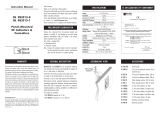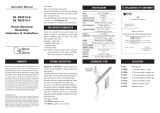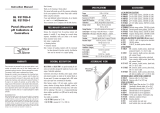Page is loading ...

WARRANTY
Instruction Manual
BL 983321-0
BL 983321-1
Panel-Mounted
TDS Indicators &
Controllers
GENERAL DESCRIPTION
SPECIFICATIONS
Range 0.00 to 19.99 ppm
Resolution 0.01 ppm
Accuracy (@ 20°C/68°F) ±2% f.s.
Typical EMC Deviation ±2% f.s.
TDS conversion factor 0.5
Probe HI 7634-00 EC/TDS probe (not included)
Temp.Compensation Automatic from 5 to 50°C (41 to 122°F);
ß=2%/ºC
Calibration Manual, through CAL trimmer
Dosing Contact Maximum 2A (fuse protected), 250 Vac, 30 Vdc
Contact close when measure > setpoint
Setpoint Adjustable, from 0 to 19.99 ppm
Overtime Adjustable, typically from 5 to approx. 30 minutes
Power Consumption 10 VA
Installation Category II
Power supply: External (fuse protected)
BL983321-0 12 Vdc
BL983321-1 115/230 Vac ; 50/60Hz
Dimensions 83 x 53 x 99 mm (3.3x2.1x3.9”)
ACCESSORIES
Recommendations for Users
Before using these products, make sure that they are entirely suitable for the environment
in which they are used. Operation of these instruments in residential areas could cause
unacceptable interferences to radio and TV equipment. Any variation introduced by the user
to the supplied equipment may degrade the instrument’s EMC performance. To avoid
electrical shock, do not use these instruments when voltages at the measurement surface
exceed 24 Vac or 60 Vdc. To avoid damages or burns, do not perform any measurement in
microwave ovens.
Remove the instrument from the packing material and
examine it carefully. If any damage has occurred during
shipment, immediately notify your Dealer or the nearest
Hanna Customer Service Center.
Each meter is supplied with:
• Mounting brackets
• Instruction manual
Note: Conserve all packing material until the instrument
has been observed to function correctly. Any defective
item must be returned in its original packing.
Dear Customer,
Thank you for choosing a Hanna product.
This manual will provide you with the necessary information
for the correct operation of the meter. Please read it carefully
before using the instrument.
If you need additional technical information, do not hesitate
to e-mail us at [email protected].
These instruments are in compliance with the directives.
PRELIMINARY EXAMINATION
BL983321-0 and BL983321-1 are TDS indicators and
controllers with a relay output designed for simplicity of use in
a wide range of applications.
Connections and wiring to probe, power supply and contacts
are made via the terminal blocks on the rear panel.
The probe is easy to clean and requires little maintenance.
Other features include: automatic temperature compensation
of readings, single point calibration, overtime control system,
multi-colour LED for indicating if the meter is in measure-
ment/dosing/alarm condition, possibility to set (Off-Auto-On
switch) dosing action mode.
Two models are available:
• BL 983321-0 powered at 12 Vdc
• BL 983321-1 powered at 115 or 230 Vac
HI 7634-00 EC/TDS probe
HI 7061M Probe cleaning solution, 230 mL bottle
HI 7061L Probe cleaning solution, 500 mL bottle
HI 710005 12 Vdc power adapter, US plug
HI 710006 12 Vdc power adapter, European plug
HI 710012 12 Vdc power adapter, Australian plug
HI 710013 12 Vdc power adapter, South African plug
HI 710014 12 Vdc power adapter, UK plug
HI 731326 Calibration screwdriver (20 pcs)
HI 740146 Mounting brackets
CE DECLARATION OF CONFORMITY
ASSEMBLING VIEW
These instruments are warranted for two years against defects in work-
manship and materials when used for their intended purpose and
maintained according to instructions. Probes are warranted for six months.
This warranty is limited to repair or replacement free of charge.
Damages due to accident, misuse, tampering or lack of prescribed main-
tenance are not covered. If service is required, contact the dealer from
whom you purchased the instrument. If under warranty, report the model
number, date of purchase, serial number and the nature of the failure. If
the repair is not covered by the warranty, you will be notified of the
charges incurred. If the instrument is to be returned to Hanna Instruments,
first obtain a Returned Goods Authorization Number from the Customer
Service department and then send it with shipment costs prepaid. When
shipping any instrument, make sure it is properly packaged for complete
protection.

REAR PANEL CONNECTIONS
Terminals #1: Probe
• Connect the HI 7634-00 probe by following the wires
colour indications.
Terminals #2: Power Supply
• Model BL983321-0: connect the 2 wires of a 12 Vdc
power adapter to the terminals +12 Vdc and GND.
• Model BL983321-1: connect a 3-wire power cable to the
terminals while paying attention to the correct earth (PE),
line (L) and neutral (N1 for 115 V or N2 for 230 V) contacts.
Terminals #3: Dosing Contact
• This contact drives the dosing system, accordingly to the
selected setpoint.
Note: The setpoint has a typical hysteresis value comparable
to the meter accuracy.
Terminals #4: Not Used Contact
Overtime system: jumper (#5) and trimmer (#6)
• This system allows the user to set a maximum dosing
period, by adjusting the rear trimmer from 5 (min) to
approx. 30 (max) minutes.
• When the set time is exceeded, any dosing action stops,
the LED indicator on the front panel will blink Red and the
LCD will show the “TIMEOUT” warning message. To exit
the overtime condition, set the OFF/Auto/ON switch to
“OFF” position, and then to “Auto” again.
• For disabling the overtime feature, simply remove the
jumper on the rear panel.
Note: The overtime system works only if the OFF/Auto/ON
switch is in “Auto” position.
OPERATING THE METER
Before proceeding make sure that:
• the meter has been calibrated;
• the setpoint value has been properly adjusted;
• all rear panel wiring and selections are correct;
• the Auto/OFF/ON switch is in the desired position.
Install or immerse the probe in the solution to be monitored,
then press the “MEAS” key (if necessary).
The LCD will show the TDS (ppm) value. The LED indicator will
light up Green when the meter is in measurement mode and
dosing is not active, while will light up Orange/Yellow for
signaling that a dosing action is in progress.
FUNCTIONAL DESCRIPTION
Front panel Rear panel
1. Connections for EC probe
2. Power supply terminal:
• for BL983321-0 model: 12 Vdc adapter
• for BL983321-1 model: 115 Vac or 230 Vac option
3. This contact acts as a switch for driving the dosing system (e.g.
dosing pump)
4. Not used contact
5. Jumper for enabling (jumper in) or disabling (jumper
removed) the overtime control
6. Trimmer for overtime setting (typically from 5 to 30 minutes)
1. Liquid Crystal Display
2. Switch for selecting dosing mode:
• OFF = dosing disabled
• Auto = automatic dosage, depending on setpoint value
• ON = dosing always active
3. “MEAS” key to set the instrument to measurement mode
4. “SET” key to display and set the setpoint value
5. “SET” trimmer to adjust the setpoint value
6. “CAL” trimmer
7. 3-colour LED indicator:
• Green = meter in measurement mode
• Orange/Yellow = dosing in progress
• Red, blinking = indicates an alarm condition
OPERATIONS
CALIBRATION
To calibrate the meter, proceed as follows:
• ensure the meter is in measurement mode;
• use a solution with a TDS value higher than 13 ppm and
immerse the probe;
• shake briefly and wait for reading to stabilize;
• adjust the “CAL” trimmer to read the solution TDS value
on the LCD.
SETPOINT
Press the “SET” key: the display will show the default or
previously adjusted value, together with the “SET” indication.
Using a small screwdriver adjust the “SET” trimmer until the
desired setpoint value is displayed.
After 1 minute the meter automatically returns to the normal
mode; or press the “MEAS” key.
PROBE MAINTENANCE
To improve the probe performance and prolong its life, it is
recommended to clean it regularly.
• Immerse the tip of the probe in HI 7061 Cleaning
Solution at least for one hour.
• If a more thorough cleaning is required, brush the metal
pins with very fine sandpaper.
• After cleaning, rinse the probe with tap water and
recalibrate the meter.
• When not in use, clean the probe before storing it.
ISTBL3321R3 04/05
All external cables connected to the rear panel
should end with cable lugs.
A circuit breaker (rated 6A max.) must be
connected in close proximity to the equip-
ment, and in a position easy to reach by the
operator, for disconnection of the instrument
and of all the devices connected to the relays.
/


